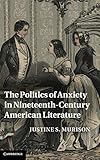The politics of anxiety in nineteenth-century American literature / Justine S. Murison.
Material type: TextLanguage: English Series: Cambridge studies in American literature and culture ; 162.Publication details: Cambridge ; New York : Cambridge University Press, 2011.Description: ix, 215 p. ; 24 cmISBN:
TextLanguage: English Series: Cambridge studies in American literature and culture ; 162.Publication details: Cambridge ; New York : Cambridge University Press, 2011.Description: ix, 215 p. ; 24 cmISBN: - 9781107007918 (hardback)
- 1107007917 (hardback)
- American literature -- 19th century -- History and criticism
- Literature and science -- United States -- History -- 19th century
- Nervous system -- Psychological aspects
- Anxiety in literature
- Mind and body in literature
- Neurosciences -- United States -- History -- 19th century
- Self in literature
- Physiology in literature
- 810.9356109034 23 MUP 2011
| Item type | Current library | Call number | Status | Date due | Barcode | |
|---|---|---|---|---|---|---|
 Books
Books
|
Eastern University Library General Stacks | 810.9356109034 MUP 2011 (Browse shelf(Opens below)) | Not For Loan | 14624 |
Includes bibliographical references (p. 179-209) and index.
1. A bond-slave to the mind: sympathy and hypochondria in Robert Montgomery Bird's Sheppard Lee -- 2. Frogs, dogs, and mobs: reflex and democracy in Edgar Allan Poe's satires -- 3. Invasions of privacy: clairvoyance and utopian failure in antebellum romance -- 4. 'All that is enthusiastic': revival and reform in Harriet Beecher Stowe's Dred -- 5. Cui bono?: spiritualism and empiricism from the Civil War to American nervousness -- Epilogue: the confidences of anxiety.
"For much of the nineteenth century, the nervous system was a medical mystery, inspiring scientific studies and exciting great public interest. Because of this widespread fascination, the nerves came to explain the means by which mind and body related to each other. By the 1830s, the nervous system helped Americans express the consequences on the body, and for society, of major historical changes. Literary writers, including Nathaniel Hawthorne and Harriet Beecher Stowe, used the nerves as a metaphor to re-imagine the role of the self amidst political, social and religious tumults, including debates about slavery and the revivals of the Second Great Awakening. Representing the 'romance' of the nervous system and its cultural impact thoughtfully and, at times, critically, the fictional experiments of this century helped construct and explore a neurological vision of the body and mind. Murison explains the impact of neurological medicine on nineteenth-century literature and culture"--
There are no comments on this title.
